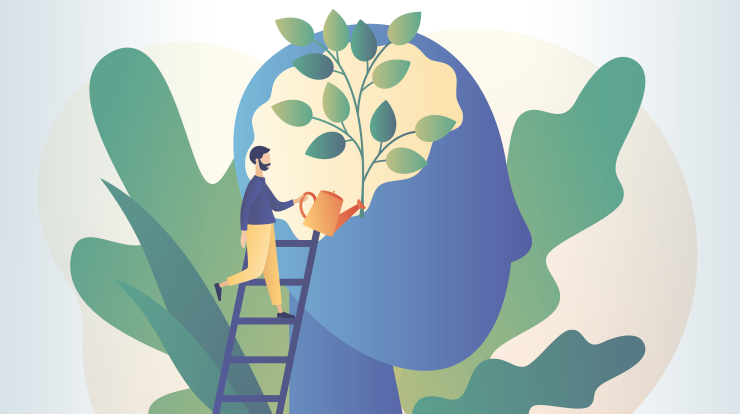When Ramona J. Smith of Cy-Fair Super Speakers in Cypress, Texas, reached the semifinals of the International Speech Contest in 2018, she was among 106 speakers from around the world. In this round, she competed directly against nine other Toastmasters to advance to the finals.
Before the semifinal competition began, all 10 competitors in her cohort waited in one room. Smith was the only woman. She was also the youngest.
She sat alone feeling a bit like a lost little girl. She wondered, Am I supposed to be here? How did I get lucky?
 Ramona J. Smith
Ramona J. SmithAn older gentleman approached her. Finally, she thought, someone was going to say something comforting or reassuring.
The man leaned in and whispered into her ear, “I’m going to beat the pants off of you.”
And just like that, her doubts vanished. Smith felt empowered. She went on to win that round and eventually become the 2018 World Champion of Public Speaking.
Smith had overcome what’s commonly known as impostor syndrome. It’s also called impostor phenomenon or impostorism to researchers.
Listen to an exclusive podcast interview with Kevin Cokley, Ph.D., and the hosts of The Toastmasters Podcast as they take a deeper dive into impostor syndrome.
What Is Impostor Syndrome?
Today, impostor syndrome is discussed everywhere—in mainstream media and on social media, on medical and leadership websites, during workshops, and more. Icons like musician Paul McCartney, actors Viola Davis and Tom Hanks, and the late poet Maya Angelou have shared their own feelings of impostor syndrome.
Psychologists Pauline Clance, Ph.D., and Suzanne Imes, Ph.D., first developed the impostor phenomenon theory in 1978. As described on Clance’s website: “Even though they are often very successful by external standards, [people experiencing impostor phenomenon] feel their success has been due to some mysterious fluke or luck or great effort; they are afraid their achievements are due to ‘breaks’ and not the result of their own ability and competence. They are also pretty certain that, unless they go to gargantuan efforts to do so, success can not be repeated. They are afraid that next time, I will blow it.”
Clance and Imes established the theory after studying high-achieving women. Since then, research has shown that men experience a sense of impostorism too. The experience can range from slight to severe.
 Mike Carr
Mike Carr“I have always felt impostor syndrome,” says 2020 World Champion of Public Speaking Mike Carr from Austin Toastmasters in Austin, Texas. “I believe if we’re pushing to do anything—pushing outside our comfort zone—we’ll move at least just past the point of discomfort and will be out of our depth. We’re going to feel impostor syndrome.”
What the Experts Say
Kevin Cokley, Ph.D., is a professor and department of educational psychology chair at the University of Texas at Austin. He’s also a leading expert on impostor phenomenon.
Cokley and eight peers from different U.S. institutions conducted a research review of 62 impostor phenomenon studies involving 14,161 participants. Published in 2020, the review found that results varied depending on the screening method, but as many as 82% of people have experienced impostor syndrome.
Cokley’s impostor phenomenon research examines how the experience manifests itself in African American students and how it differs between people of color and white people. He first learned about impostor phenomenon while working on another study. It related to his work and was relevant to his own life. “I experienced impostor phenomenon before I knew the concept,” he says.
It was during his first year as an assistant professor. He was surrounded by people who, at the time, were more published than he was. It was a competitive environment. “I knew that I was smart and worthy of the job,” he says, “but I didn’t feel like I belonged there.”
Those feelings motivated him. “It lit a fire under me,” says Cokley. “It forced me to be a workaholic, which is not necessarily a healthy thing. I felt like I had something to prove.”

Overpreparation is one path of what Clance calls the impostor cycle. The other path is procrastination, which is how Jessica Collett, Ph.D., professor and sociology vice chair at the University of California, Los Angeles, responds to feelings of impostorism. She researches the phenomenon and has experienced it too.
Collett was in graduate school when she first learned of the impostor phenomenon. A professor shared the concept. “At the time, I didn’t know there was a term for it,” she says. “It was just something I had experienced.”
She was a first-generation college student. Her parents owned a restaurant and expected her to join the business. Impostor phenomenon kicked in during college. “I was a terrible high school student and in college I excelled,” says Collett. “I questioned that.”
Fortunately, she had mentors in undergraduate and graduate school who pushed her and helped her overcome any hesitation. When she searched for a job after graduate school, Collett considered accepting a lecturer position instead of a more prestigious tenure-track research professorship. A mentor convinced her to give the tenure track position a try.
One of her studies examined why women who attended graduate school in the United States with the intent of becoming a professor shifted away from that goal. Similar to her own experience, she found that those who gave up that goal are more likely to struggle with impostorism.
In the same study, Collett found that students who were not raised in the United States, particularly those from Asia, are less likely to experience impostor syndrome compared to U.S. students. She believes it could relate to cultural ideals. “In the United States, many believe intellectual ability is innate—that you’re born with it,” she says. “Whereas in East Asian cultures, there’s more of an idea that you gain intelligence through hard work and practice. Then you’re less likely to feel like an impostor because you know you’ve done the work.”
“The victory is not in the results; the victory is in the try. I preach it to my kids. It saved my career life. I just gave myself the permission to try. And be human.”
—Mike CarrCurrently, a significant amount of impostor phenomenon research is examining racial, ethnicity, culture, and professional background diversity. A particular focus is the underrepresentation of women and people of color in the STEM disciplines—science, technology, engineering, and mathematics.
Other areas of research include generational status, such as first-generation college students, and traditional gender expectations. “For example, could a male nurse experience feelings of impostorism because it’s not what that society expects?” says Collett. Scholars are also looking at the consequences of impostorism and the costs for individuals and society, including the areas of career goals, mental health, and employee burnout.
Although Maureen Gannon, Ph.D., professor and associate dean for faculty development at Vanderbilt University School of Medicine in Nashville, Tennessee, doesn’t study impostor syndrome, she keeps up with the research and gives presentations about it to faculty and high school, undergraduate, and graduate students. She learned about impostor syndrome at a women’s leadership development workshop and realized she’s felt it throughout the years.
“I come from a lower socioeconomic background and had to get a full scholarship to a college preparatory high school,” says Gannon. Her peers were from wealthy families. Intellectually, she did well. “But I felt like I didn’t belong there. I didn’t have the pedigree,” she says. That’s when she first experienced impostor syndrome.
It took her two years before she told friends she was there on scholarship. In the meantime, she couldn’t fully be herself. She was worried they would think she didn’t belong either. Once she trusted them, she opened up. They understood and made her feel included.
With impostor syndrome, feelings can ebb and flow. Gannon receives a lot of positive feedback, but doubts still creep up whenever she’s in a new role.
What Impostor Syndrome Isn’t
The term “syndrome” can be misleading. Gannon emphasizes that impostor syndrome isn’t a clinical diagnosis or mental disorder. However, she says if you don’t address it, it can lead to things that are worse, like anxiety and depression.
It’s important to remember that people experiencing impostor syndrome are high achievers and tend to be very successful in their careers. It’s also not the same as a lack of self-confidence. People with impostor syndrome often have a lot of self-confidence, self-worth, and self-respect. They don’t feel like failures. “It’s just that they feel like they don’t have the right background or pedigree or come from the right family of origin or have the right training to be in the particular situation,” says Gannon.
It’s important to remember that people experiencing impostor syndrome are high achievers and tend to be very successful in their careers.
The first time Carr felt impostor syndrome deeply was when he started his first financial advising business. “I was counseling people who were about to retire about how they can live 40-plus years with an investment strategy that was proven, yet I hadn’t even lived 40 years, period.” Carr overprepared. He also talked with others.
As he shared in his 2020 world championship speech, Carr learned to shift his mindset. “The victory is not in the results; the victory is in the try,” he says. “I preach it to my kids. It saved my career life. I just gave myself the permission to try. And be human.”
Carr says that when you go onstage, everyone in your audience is more of an expert than you are in something. Instead of that causing stress, he says that’s good news. “It means you’re an expert in something too, and it’s that perspective you bring that makes you unique—and not an impostor,” he says.
Still, Carr has feelings of impostor syndrome whenever he tries something new. “I’m there all the time,” he says. “We’re all in the same boat.”
 Verity Price, DTM
Verity Price, DTM2021 World Champion of Public Speaking Verity Price, DTM, from ToastED Toastmaster club, Cape Town, South Africa, agrees. She experienced impostor syndrome when she became world champion. Before winning, she put champions on a pedestal. After winning, she was asked to speak to clubs worldwide and teach people how to write speeches and win the championship.
“I feel like I’m the newbie, like an impostor,” she says. “I’ve shared that with the world champions I’m friends with, and they’ve told me they had exactly the same feeling when they started and you just have to keep showing up and sharing your truth, your journey, your experience. They said there will always be people with more experience, but no one will have your experience.”
Just like Smith, who sat alone—the only woman and the youngest in her cohort—waiting to compete in the semifinals and share her truth. For her, it all came down to how she got there and why she was there. Remembering her how and why transformed a lost little girl into a world champion.
Jennifer L Blanck, DTM has more than 25 years of career development and advising experience. She is a member of 5-Star Toastmasters Club in Arlington, Virginia, and AAMC Toastmasters in Washington, D.C., as well as a regular contributor to the Toastmaster magazine. Learn more at jenniferlblanck.com



 Previous
Previous

 How to Manage Those Impostor Feelings
How to Manage Those Impostor Feelings
 Previous Article
Previous Article



